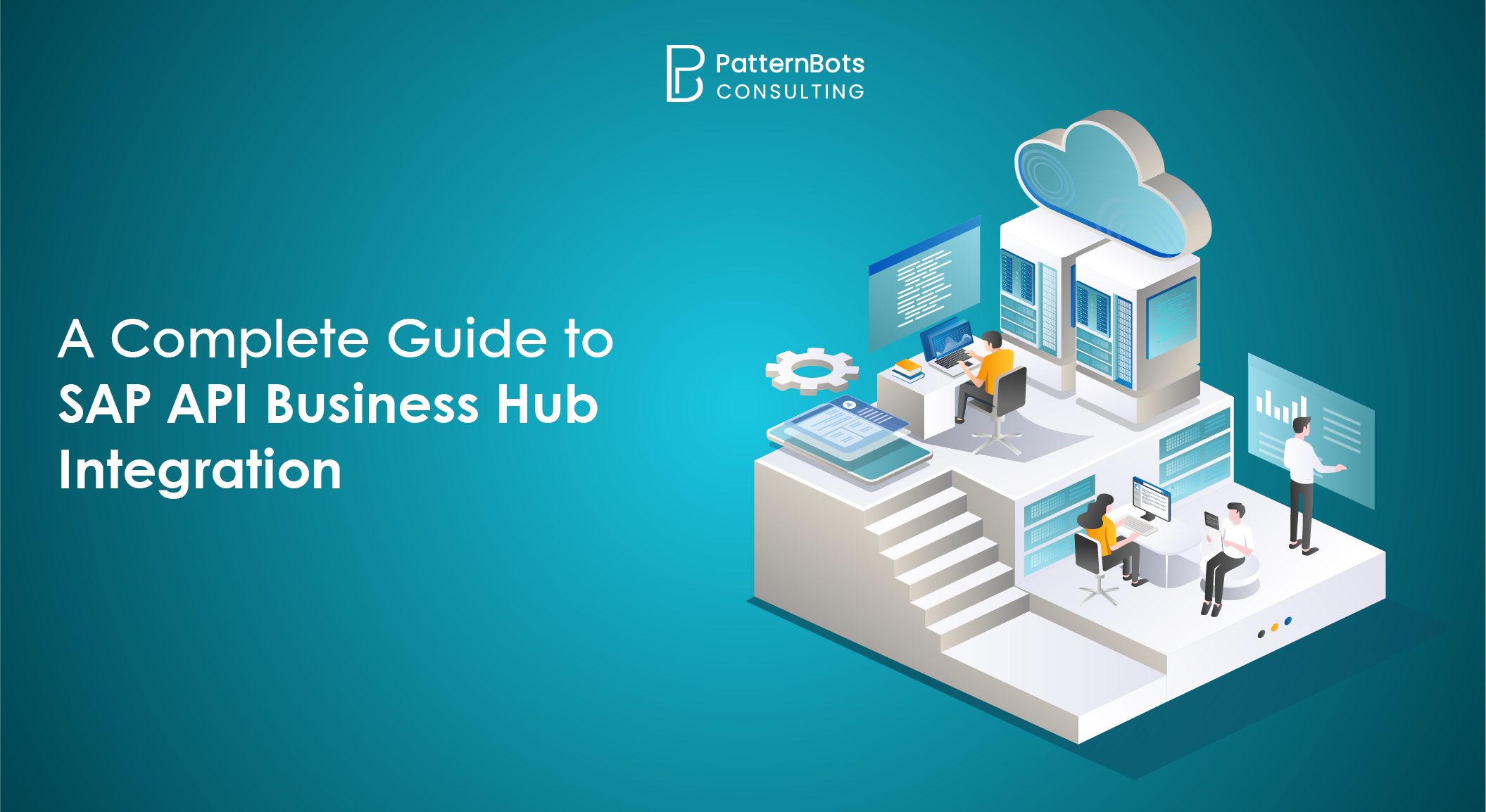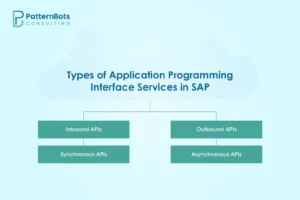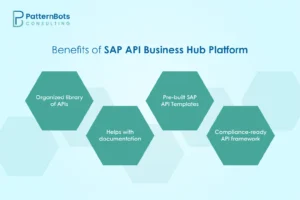
- Posted on
- Bhanu Pratap
Most developers cannot build what they want to, as they are stuck stitching systems together. According to a report from Precisely, 61% of businesses say that integration challenges are holding back IT productivity.
It’s a growing problem in SAP environments where every new process needs to connect across modules, apps, and external platforms. Too many organisations rely on manual integrations or old-school connectors because they don’t know what’s already available through the SAP API Business Hub.
So, in this blog, we will explain how SAP API Business Hub can help your business automate these tasks. You’ll learn how it supports clean integrations, accelerates development, and helps developers work on what really matters.
What is SAP API Business Hub?
The SAP API Business Hub is a completely integrated platform that acts as a central repository for all important SAP integration information, including application programming interfaces (APIs), connectors, CDS views, event objects, and more.
Businesses can integrate different SAP software solutions with external systems by using API Business Hub. Not only this, developers can ease off their work by building connectors for existing SAP solutions and creating customised applications for further improving the connection between SAP and other non-SAP systems.
Just like the Play Store and App Store have different applications for different categories, the SAP API Business Hub has a variety of APIs that developers need to build new apps, connect SAP systems with other software, and automate business processes.
Different challenges that SAP API Hub solves
There are different challenges related to application development and system integration that SAP API resolves by streamlining connections between SAP systems and APIs. By using SAP Business Accelerator Hub, you can also get rid of these issues:
Discovery and documentation issues
Businesses in different industries find it difficult to identify the right SAP API that integrates well with their systems. With the SAP API Business Hub platform, this process becomes easier, as this unified location lets you find all the major SAP APIs and access detailed information related to documentation and integration.
Data security and version management
The SAP API Business Hub helps developers stay updated about the latest API versions and important compliances. With pre-built version management capabilities and highly advanced data models, it also protects sensitive data and ensures security and compliance across all connected systems.
Slow development process
Building custom applications in your SAP landscape and creating codes from scratch is a time-consuming process. To make it easier, SAP API Business Hub provides in-built sample codes and templates so that developers can directly jumpstart with integration projects.
Types of Application Programming Interface Services in SAP

For easier communication between SAP and external systems, SAP API Hub supports the following API services:
1. Inbound APIs
In inbound APIs, SAP Hub offers services that are used by another external system.
For example, SAP’s Batches API allows external systems to create and manage batch records within SAP S/4HANA for life sciences.
2. Outbound APIs
In outbound APIs, the SAP hub uses a service that another external system has provided.
For example, SAP S/4HANA uses the Outbound Delivery API to retrieve delivery information and integrate it with external logistics systems.
3. Synchronous APIs
In synchronous APIs, the SAP system waits for a response from the receiving system while sending a request.
For example, SAP Ariba’s Operational Reporting for Procurement API provides real-time requisition data, ensuring an immediate response for procurement analytics.
4. Asynchronous APIs
In asynchronous APIs, the SAP system waits until the receiving system acknowledges the receipt of the message after sending a request. However, it doesn’t wait for any response to continue the work.
For example, SAP’s Journal Entry – Change API processes updates to journal entries asynchronously, ensuring effective batch processing.
Major Web Services Categories in the SAP Cloud Platform
APIs created by SAP systems are mainly used to improve communication and integration between SAP and third-party tools. Here are some examples of the main service categories provided by the SAP API Business Hub platform:
1. Business to business
By using this service category, business documents and critical data are exchanged between companies.
For example, SAP Ariba’s APIs facilitate electronic procurement by enabling suppliers and buyers to exchange purchase orders and invoices seamlessly.
2. Application to application
This API enables the exchange of data between different systems to connect the business processes within the company.
For example, SAP S/4HANA’s APIs allow integration between finance and logistics modules, ensuring synchronised data across internal business processes.
3. Application to cross-application
This API helps in exchanging business information between external applications and internal systems.
For example, SAP’s APIs enable external applications to access internal business data, such as retrieving customer information from SAP systems.
Benefits of SAP API Business Hub Platform

Businesses can easily integrate SAP and non-SAP systems when they use API Business Hub. In addition, there are different advantages of using application programming interface services in SAP:
1. Organized library of APIs
When businesses use SAP Landscape, they get an organised catalogue of SAP APIs, templates, and integration content, which makes it easy to find important APIs and integration assets as per the business needs.
2. Helps with documentation
For each API, there is detailed documentation and an in-depth guide available at SAP API Hub. So, it becomes easier for the developers to use the APIs more effectively and speed up the development process across the landscape.
3. Pre-built SAP API Templates
You can also find pre-built templates and sample codes in the API Business Hub to quickly start developing projects. You can also accelerate user adoption and follow best practices with these codes, making interactions among SAP and non-SAP systems easier.
4. Compliance-ready API framework
The SAP API Business Hub has version management functionality for APIs that helps developers in tracking the changes and updates. It also helps in improving data security and compliance, ensuring that integrated systems and APIs adhere to every security standard.
How can PatternBots help you with the SAP API Business Hub?
If you’re looking to streamline system integration and speed up development using the SAP API Business Hub, PatternBots is here to support you. Our expert consultancy services will help you identify, configure, and implement the right APIs and integration tools based on your company’s unique technical landscape.
With over 15 years of experience in SAP solutions, our SAP integration consultants can assist you with API discovery, version management, and end-to-end integration planning. Work with us to simplify integration, reduce development time, and level up the security and scalability of your SAP ecosystem.
Conclusion
APIs from SAP Business Accelerator Hub help design and develop custom applications and dependent extension tools. You can also integrate systems, like SAP SuccessFactors, SAP ECC, and SAP S/4HANA, with external systems to connect core business processes across the technical landscape. If you are curious about implementing SAP systems and APIs in your business, then PatternBots can help you with that.
Frequently Asked Questions
The SAP API Business Hub is a platform where you can find APIs, prebuilt integrations, events, and essential SAP documentation. It’s like a toolbox for connecting SAP systems with each other and with non-SAP platforms as well.
In SAP API Business Hub, there are four different types of APIs: inbound APIs (for receiving data), outbound APIs (for sending data), and synchronous or asynchronous APIs that handle responses in different ways. Each one serves a specific purpose, depending on how systems need to respond to each other.
Yes, SAP API Business Hub is designed to support SAP and non-SAP ecosystems, which is useful when dealing with a hybrid IT landscape. It helps companies connect SAP S/4HANA with Salesforce or SAP SuccessFactors with third-party payroll tools.
When developers start using SAP API Business Hub, finding the right API for different landscapes becomes easier. It also offers documentation, sample code, and security features all in one place.
The SAP API hub gives you access to APIs that align well with business flows, helping you build process-driven integrations instead of system-driven ones. For example, if you’re trying to connect your lead-to-cash or source-to-pay process between different systems, you can easily do that with the SAP API Business Hub.